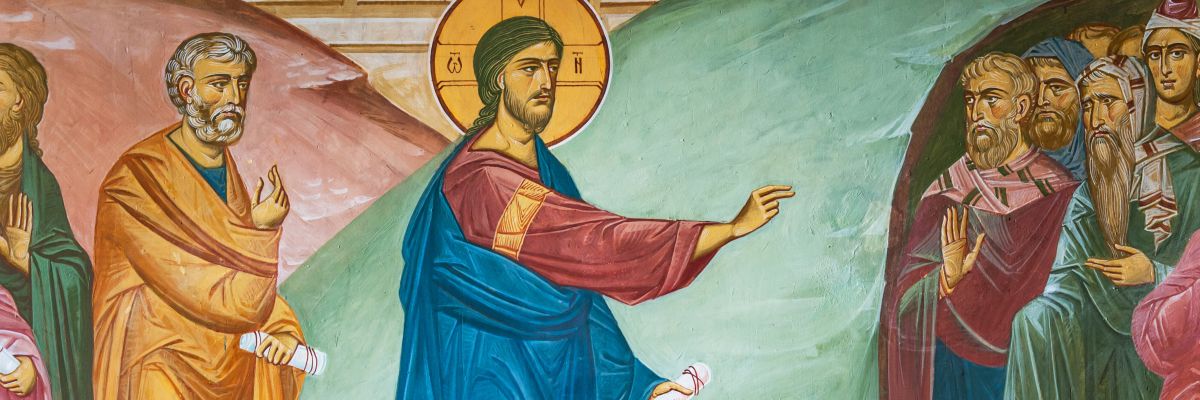
Man has an intellect and a will. The intellect is oriented to knowing the cause of all the things which man experiences as effects in this world. By an ascent of truth, it is possible (and some human beings have been able) to ascend to the knowledge that God exists and is one, truth, love, Creator, and provident. This can be known through reason alone. Yet, this is not enough for anyone.
Left to this sort of knowledge of God, man is like the fox before the grapes. The fox goes away sad because he wants to taste of the delicious grapes, but he cannot. Man wants to grasp God, but his mind cannot fathom the depth of truth in God. Man, by the very fact of his being created with an intellect, is called to another sort of knowledge of God than simply the kind which philosophers have arrived at by their reason alone.
Each thing God has made manifests his truth. But he communicates his nature in a special way to man, who is invited to participate in his nature, to share fellowship with the Trinity. This fellowship is proclaimed in 2 Peter 1:4, where Peter says that God has given us great and precious gifts by which we become “partakers in divine nature.”
The special love of God is shown for us in the communication of his truth. Communication is necessary for even natural relationships of love like marriage. This communication is even more necessary for the divine communion with the Holy Trinity promised to us in John 17. We are to be consecrated in the truth of God’s Word.
The prime revealer and revelation of that Word is the Word of God himself, our Lord Jesus Christ. As Thomas Aquinas put it, “In him we see our God made visible and so are caught up in love of the God we cannot see.”
The Catholic Church has always held that Christ is the primary revealer and revelation of the Trinity. Through his body, blood, and human soul he reveals what the mercy of God is. There are some Christian denominations that think we need no mediators between our own minds and wills and God. They deny the sacraments and the mediation of the priesthood under the guise of possessing some sort of inner light.
If there is no physical mediation necessary for the truth of God to be revealed to man, then surely the human nature of Christ is in no sense necessary for revelation to man. Yet this is the cornerstone of the Christian religion. It is only through the deeds and words of Christ that man has real access to God.
The ascent of man’s being is only completed in the revelation of truth offered by Christ. He experiences the Word in whom the world was made. Even those under the dispensation of the Old Law believed in faith in the future mediator, and it was only with the coming of that mediator and his sacrificial priesthood that man could finally be introduced into direct, though limited, knowledge of the Trinity.
All that Jesus did and taught is the fullness of divine revelation. By his teaching he explains the final covenant; by his deeds he accomplishes the final covenant. There is no new public and formal revelation of the Father, Son, and Holy Spirit other than the one given by Christ. His mission is completed with the sending of the Spirit of Truth on the apostles in the one and only Pentecost. Tradition, Scripture, and magisterium are all human responses to this revelation, and they all presuppose this revelation and faith.
The obedience of faith is the bedrock response to this revelation of Christ. Faith is an action of both the intellect and will. A man’s will is moved by the fact that Christ fulfills the prophecies of the Old Law and does works which only God could do (what have been termed theandric acts) to assent to Jesus as the Word who can neither deceive nor be deceived. Once a man is so moved, his intellect continually assents to the teachings of Christ as the direct revelation of God himself.
Faith is unlike all other human knowledge. It is unlike human science, opinion, and doubt because faith is not knowledge of the mind convinced by the inner character of the evidence, but the mind convinced by the strength of the will adhering in personal reverence for the one revealing. Faith involves then the simultaneous movement of the intellect and will. Faith is a participation in a divine way of knowing in which we look at the world from God’s point of view. It can never suffer a merely human explanation.
It is true that there are many truths of faith which reason can also demonstratively prove. Some were mentioned above: that God exists, that he is one, that he is truth itself. But there are other truths which demand God revealing. These are basically two: the Trinity and the Incarnation.
Two conclusions about faith flow from these ideas.
First, though faith involves assent to propositions, it cannot be reduced to merely intellectual study. The science of faith is the highest of sciences because by faith man looks at the world from God’s point of view, but it is unlike human science because it depends on the movement of the will to the one revealing. Faith always involves a personal relationship with Christ.
Second, faith is never merely a fulfillment judged by human need or human science. God is not in the dock to be judged on the basis of how meaningful he is to me. I am judged by how meaningful I am to him. God’s reason is the standard, not man’s.
Since God’s speech is revealed in the words and works of his Son and the human response to these words and works is faith, Christ wished his words and works to be handed on perpetually to the whole human race so it might come to believe in Him. Christ chose witnesses and intimately associated them with himself in his own ministry of mediation.
They could not change or invent the words and works. They could explain from their own association with him which were true words and works. The basic requirement for being an apostle was to be an eyewitness to all that Jesus did and taught that others might believe. Christ himself commissioned the apostles to preach his words and deeds to the whole world. This is Tradition. The apostles preached what had been handed on to them. They handed on this faith by word of mouth (2 Thess. 2:15).
The message of Christ was passed on first of all by personal contact. Christianity can never be a mere religion of the book. The Lord Jesus demands a personal encounter of knowledge and love with him. This knowledge, like all knowledge, is composed of propositions, later expressed as dogmas. Tradition predates Scripture and is its source.
Though the experience of the human author is important in assessing the context and intention of Scripture, the primary author is the Holy Spirit. Just as the Holy Spirit had to move the mind of the apostles to accept Christ as God, so he had to move the mind of the writers of the New Testament to express their experience of Christ in writing. All the Church is and believes and confesses in speech about Christ’s word and works is also passed down in writing.
There is an old tradition that the twelve apostles each spoke an article of the Creed on the occasion of Pentecost. Though the historical character of this tradition need not detain us long, the judgment of the Church that the creed expresses the actual experience of the apostles is clear.
The apostolic origin of the New Testament has long been questioned by modern exegetes. The basis of this theory was the supposition that Mark must be the first Gospel and composed rather late historically. New scholarly evidence has come to light, and there is now a significant group of exegetes who hold that Matthew, an eyewitness to all Jesus did and taught was the author of the first Gospel before A.D. 45.
Luke wrote the second Gospel as the urging of Paul for the Gentile mission. Though neither Paul nor Luke was an eyewitness to the life of Christ (though theologically Paul’s Damascus experience might be considered as an extraordinary experience of this), they consulted people who were. In the case of the infancy narratives, for example, they consulted Mary.
The third Gospel was that of Mark, who was a disciple of Peter. This reflects a request of the Church for Peter to publicly comment on the concordance of and difference between Matthew and Luke, which he did. Mark is a record of this with some additions. (For a complete treatment of this position, see The Order of the Synoptics, by Bernard Orchard and Harold Riley.)
One might say that Tradition and Scripture, though distinct as spoken and written, are not two independent forms of revelation. They form the one deposit of faith. They are equally the Word of God. They are equal because both spring from one revealer and revelation, Christ. Both express the mystery of God’s speech given to enlighten the human intellect, but in different ways. Both are necessary cooperations in human salvation.
Scripture is the Word of God written down under the inspiration of the Holy Splrit. Tradition is the Word of God handed on by Christ and the Holy Spirit to the apostles and their successors. They can in no sense be in opposition. Tradition is the source of Scripture, and those books which have been judged to be inspired and therefore in the canon are judged on the basis of how well they express the whole, unadulterated faith of the believing Church.
The purpose of Scripture and Tradition is to preserve the one deposit of faith about Christ. The authentic interpreter of this Word of God present in both Scripture and Tradition is the magisterium, which alone has the right to interpret Scripture and Tradition with the assistance of the Holy Spirit promised by Christ. By this assistance, Christ is with the Church until the end of the world.
The pope expresses this common Word of God and defines its contents, with the assistance of the Holy Spirit, when he speaks ex cathedra. This is not because he has studied or is a good man. The source of this infallibility is a charismatic gift of the Holy Spirit which functions regardless of the moral goodness of the one who exercises it.
This magisterium is not an independent experience of the Word of God outside Scripture and Tradition. The magisterium cannot define new doctrines which are not contained at least implicitly in Scripture and Tradition. The magisterium is not a source for new revelation. By the promised aid of the Holy Spirit, the magisterium expresses what the faith of the apostles has always been, whether in the written or the spoken witness to the Word of God. The magisterium cannot make a new revelation. It is the servant of the one deposit of faith contained in Scripture and Tradition.
Scripture and Tradition must be the sources of our faith in the Word of God (1 Cor. 11:2). In hearing both, we experience the Word living in our souls by the power of the Spirit. “We proclaim to you the eternal life which was with the Father and was made manifest to us that which we have seen and heard we proclaim also to you, so that you may have fellowship with us; and our fellowship is with the Father and with his Son Jesus Christ” (1 John 1:23).



